House Three Thirty Continues the LeBron James Family Foundation's Promise to Akron
by Danny Cunningham | Dec. 30, 2024 | 10:00 AM

Courtesy The LeBron James Family Foundation
LeBron James wears a rubber band on his wrist. Typically yellow with purple lettering, the colorway of his Los Angeles Lakers, the bracelet carries a bold statement: “I PROMISE.” The message reminds the superstar athlete of his mission — the one that’s bigger than his goals on the court. His promise to uplift the community that made him.
“In our community, that’s the No. 1 thing,” James tells Cleveland Magazine in an exclusive interview. “To be able to reach your full potential, you got to have people in a support system, the people around you, to be able to say, ‘We believe in you.’”
LeBron James grew up in North Hill, one of the more impoverished neighborhoods in Akron, and was raised by a single mom. He graduated from St. Vincent-St. Mary in Akron before starting his professional career with the Cleveland Cavaliers in 2003. As his name and successes grew in stature and fame, he hasn’t forgotten where it all started.
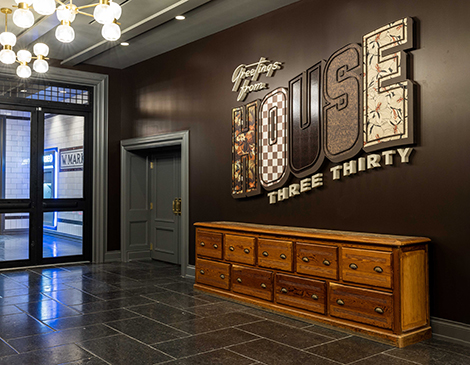
One of the first community endeavors that the LeBron James Family Foundation attempted was the King For Kids Bike-A-Thon, dating to 2006 during his first stint with the Cleveland Cavaliers. At the event, James rode bikes with kids in Akron, pedaling through neighborhood streets like he did in his childhood. Each child left that day with a new bicycle, but that singular day each summer wasn’t doing enough to deliver on James’s promise to help those in Akron, a city that has struggled economically since the decline of the rubber industry started 50 years ago.
“It was a great event for a day, but when kids went home with those bikes, we didn’t know if they were going home with a roof over their heads,” says Michele Campbell, the executive director of the LeBron James Family Foundation. “It wasn’t really moving the needle for us.”
RELATED: LeBron James' Home Court is a Bucket List Trip for Any Fan
That changed in 2018, when his LeBron James Family Foundation started the I Promise School for at-risk elementary students in Highland Square, a neighborhood right outside of Downtown Akron. Inspired to help after reading about the dismal high school graduation rates (below 80% in 2018, according to Akron Public Schools) in his hometown, his pledge to pay free tuition to the University of Akron for any I Promise School graduate was a carrot he hoped would lead the next generation to improve their education outcomes. Since 2020, some of those students have walked the four blocks each morning from I Promise Village, a historic apartment complex that James’s foundation turned into temporary assisted living for students and their parents. To date, the LeBron James Family Foundation has been involved with 1,600 I Promise Students and families.
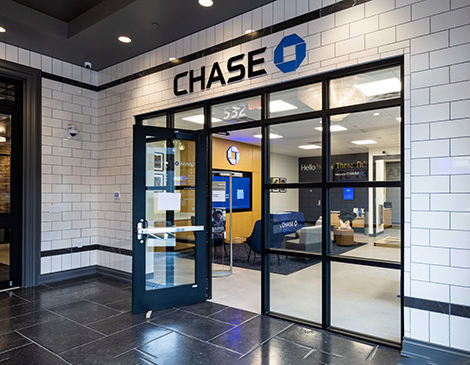
In March 2023, the foundation added House Three Thirty, the most public of its group of community spaces. Tucked between the I Promise School and the I Promise Village on West Market Street, the 60,000-square-foot building presents as an entertainment venue, complete with shopping, dining and events. House Three Thirty exists to give families in the LeBron James Family Foundation the opportunity to grow their employable skills and change their lives for the better. As of December 2024, there are 65 people working there.
Many visitors who walk through the main entrance of House Three Thirty and into the retail shop pass one-of-a-kind merchandise — sweatshirts, art and James’s practice- and game-worn shoes — to get an I Promise wristband in their favorite color combination. It’s not the only reason they come, though. House Three Thirty features a coffee shop, multiple eateries, a theater and the LeBron James Home Court multimedia museum. A full-service restaurant is coming soon. The space hosts competitions, seminars, weddings, family reunions and cooking classes in its corporate kitchen. The foundation goes so far as to refer to its employees at House Three Thirty as family members.
House Three Thirty used to be the home of The Tangier. Ed George inherited the building from his father, who first opened a restaurant at a different Akron location before relocating to its current site in 1958. There, The Tangier hosted concerts in the ‘70s and ‘80s with major headliners such as Tina Turner, The Temptations, Jerry Lee Lewis and Ray Charles. The venue’s history intertwined with James’s early outreach efforts, hosting a charity billiards tournament as part of the King for Kids Bike-A-Thon.
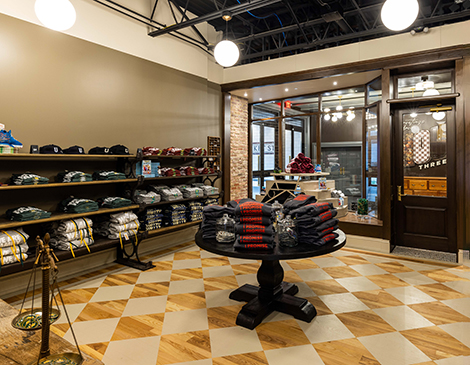
A drastic remodel keeps the history alive. The Cabaret, which once hosted iconic stars, has been updated while maintaining its elegance and romance. New luxury red seating and timeless red curtains give the feel of the venue, without the decades’ worth of wear and tear.
New restaurants Secret Pizza and The Sweet Shop offer local flair. Northeast Ohio-based Kaulig Companies sponsors the box seats in the Cabaret, and J.M. Smucker Co., headquartered in Orville, Ohio, supports tasty conversations in the Hometown Hall. The rest of House Three Thirty is largely dominated by national corporations, such as Starbucks.
It’s easy to write the spaces off as run-of-the-mill chains, but these behemoth companies have made a promise, too.
Near the entrance is a unique branch of Chase Bank. A clock made up of 12 shoes in LeBron’s signature Nike line hangs on the wall. Beyond typical banking services, this branch taps into financial literacy; any Akronite can step in to use the bank and access its financial education series, with 22 classes that range from teaching how to budget to repairing credit.
Placing the bank in a prominent spot near the entrance isn’t by accident.
“When LeBron decided to take his career out of Ohio to Florida, a lot of people left us at the time, a lot of partners. That partner never left us,” says Campbell of the relationship with Chase. “They never wavered. They always stood beside us.”
RELATED: Cleveland Magazine's Most Interesting People of 2025
Others weren’t so sure. When the building was being renovated after its purchase in 2020, including a Starbucks was a no-brainer. Everyone at the foundation wanted to start their day and grab a mid-morning pick-me-up with coffee’s most well-known name.
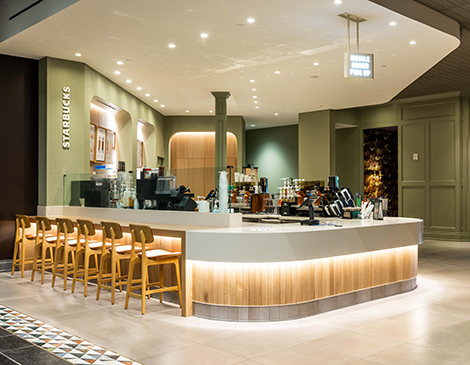
Except it wasn’t a no-brainer for Starbucks. Campbell says the coffee giant needed some convincing to allow for a location inside House Three Thirty. This location is staffed by a rotating cast of James Family Foundation family members, as opposed to the traditionally trained baristas you will find at other locations. Starbucks also has certain requirements when franchising. Ideally, new locations can have a drive-thru, which House Three Thirty does not. Despite largely being a company that touts inclusivity, it doesn’t properly serve urban areas in the same way it does wealthy suburban neighborhoods.
“We went into some greater conversations with them about what they were portraying, what they were to the world, that they’re inclusive and they’re for everyone. And when we started to dig into that — very inclusive to suburbs. But how about the urban areas?” Campbell says. “And we’re definitely in an urban area right here, and we wanted to infuse in an urban area.”
For locals, House Three Thirty is a safe place to be in a neighborhood that hasn’t always had access to amenities like these. For families in the LeBron James Family Foundation it’s a chance to feel believed in, to improve skills and to better a life. For James, it’s another chance to keep his promise to Akron.
“I knew if I ever got successful in anything in life, I wanted to give back to my community,” says James. “To be able to give families, to be able to give our kids an opportunity to be able to grow, that’s what’s most important.”
It’s a gloomy and rainy Akron afternoon on a Tuesday in October. Walking into House Three Thirty, you’re immediately greeted by an employee wishing you a happy Taco Tuesday. On the ceiling hang more than a dozen bicycle wheels, serving as a reminder of the King for Kids Bike-A-Thon. Moving forward is the common area near Starbucks filled with Akronites enjoying a coffee or working on laptops. Regulars are greeted by name while giving their orders. On any random day, you’ll see an employee wearing a Nike shirt that says “We Are Family” across the chest with the foundation’s logo on it.
Off to the side of Starbucks, a barn-style door is slid open to reveal the worst-kept secret in the building, a speakeasy-style slice shop named Secret Pizza.
The slice shop is simple, keeping its menu limited to pizza, calzones and one sub sandwich, with Pepsi available by the can from a fridge. Those making the pies are family members. They’re not lifelong culinary artists, hospitality professionals or even former part-timers at their local pizza joints. They’re learning on the job how to make the perfect pepperoni — or sausage, or cheese — pizza.
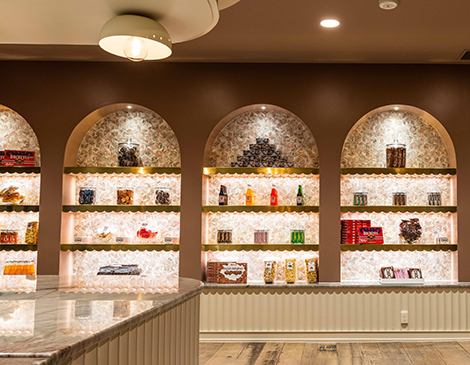
All House Three Thirty employees have nicknames, as families tend to. Campbell is affectionately called “Boss.” Nick Lopez, who contributes to aspects of the business including creative branding, goes by “Nach.” Vaughn Myers, the director of events, answers to “Peanut.”
Doug Petkovic has a nickname, too: “Dream Crusher.”
That’s because, at first, Petkovic — a well-known restaurateur and partner in Michael Symon’s restaurants — told Campbell this thing was a bad idea.
“When Michele told me who was going to work here, I’m like, ‘Yeah, this is never going to work,’” Petkovic says. “Like, I’m sorry. Not one person? We’re not interviewing anybody with experience? No? We’re just bringing all of our families together, interviewing them, picking the people that are right for us? And like, they don’t have to have any experience?”
Campbell told him no.
The idea was for House Three Thirty to be staffed by the families that the LeBron James Family Foundation was created to support. It was meant to develop and enrich their lives. The jobs would help them learn skills that could transfer to promotions to outside businesses and ultimately successful careers.
RELATED: Dreaming About LeBron in 2050: Future of Cleveland
But more than just job training, building competence in hospitality, customer service, event management and even pizza-making would be fulfilling for family members down on their luck.
“A lot of the things you can use in the events industry, facility operation, retail, customer service, are transferable skills,” Myers says. “So, do we love the people that are here? Yeah. Do we want them to stay here for a long time? Yes, but if they move on and get a better job because of the skills that we’ve given them, we’ve accomplished our goals.”
In the corporate world, there are few times when life is allowed to get in the way of employees. Miss a shift? Don’t expect to keep your job. Do you have a child at home sick? Better find a way to make it to work. At House Three Thirty, things work a little differently. Employees’ shifts are balanced with demands outside of work, like childcare and school — and skills develop over time. Chefs learn how to run a successful business, even if they might start out burning a few crusts.
“We want to be able to be in a position where we can give them the tools to just live a better life,” says James.
It’s working, too. Secret Pizza won’t end up on a Michelin Star list, but the pizza is legitimately good and adding secret sauce — a hot honey type of condiment — only makes it better.
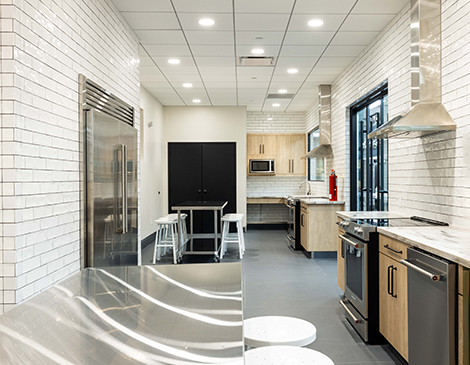
“But all in all, [the pizza] is awesome,” Petkovic says. “They do a phenomenal job. This is coming from someone who’s never tossed a pie, who never made dough in their life, is who is making it now. And they own it.”
In a house of nicknames, House Three Thirty family member Ciara DeBruce is more commonly known as “CeCe.” Another nickname exists for her, too. She’s known to some as “Miss Perfect” because of the habit she’s made of always trying to be her best. DeBruce found her way here through her daughter, who was part of the first class at I Promise School.
Since then, she’s been part of the family.
“I always like to say that she was drafted, but they took the whole family,” DeBruce says. “She’s the one who actually went to the school, but we’ve all benefited from her being drafted to the school in so many ways.”
Those benefits have included legal help, using the school’s food pantry and finding employment. She was an associate banker at Chase Bank — not the one at House Three Thirty — thanks to help from the foundation. When the offer to work at House Three Thirty arose, she couldn’t pass it up.
“I stayed [at Chase] until we got the offer for this. And then it was like, ‘OK, here I go,’” she says. “Whatever it is that the foundation is doing, I’m always gonna, if I have the opportunity, want to be a part of it, just because they have given so much to me and my family.”
Now DeBruce is a shift lead at House Three Thirty. She will begin leading tours of the building in 2025. She’s learned how to serve during big events held in the ballroom, creating different dishes using various flavors in the on-site kitchen, thanks in part to a course by Graduate Hotels and Saira Hospitality.
The LeBron James Family Foundation also enriched the life of her daughter, who has transformed her into a fearless young woman in the six years since she first started at I Promise School, DeBruce says.
Many struggle to put into words what it means to them. The idea of being believed in. Experiencing belief from others and in yourself for the first time. The promise that it’s never too late to change the trajectory of your life. It’s not something that’s seen. It’s something that is felt, says DeBruce.
“I didn’t know that I was lacking that until I started receiving it,” DeBruce says. “Then it was like, Oh yeah, it doesn’t have to be all about pouring it into the kids. It’s OK to pour something into me, and then I’ll have more to pour back into them.”
That’s why House Three Thirty exists.
That’s LeBron James’s promise.
“Sometimes you just don’t feel like you mean much to people, or mean much to anything or you don’t feel like you have a purpose,” says James. “And for us to have the people at House Three Thirty, to give our families and our parents and our kids a meaning in life, that is one of the best things that we can ever do.”
For more updates about Cleveland, sign up for our Cleveland Magazine Daily newsletter, delivered to your inbox six times a week.
Cleveland Magazine is also available in print, publishing 12 times a year with immersive features, helpful guides and beautiful photography and design.
Danny Cunningham
Danny Cunningham has worked with Cleveland Magazine since October 2024 after previous stops at ESPN Cleveland, SKOR North and Complex Sports. He also is the host of the Locked On Cavs Podcast and runs a Substack, The Inside Shot, which covers the Cleveland Cavaliers.
Trending
-
1
-
2
-
3
-
4
-
5










